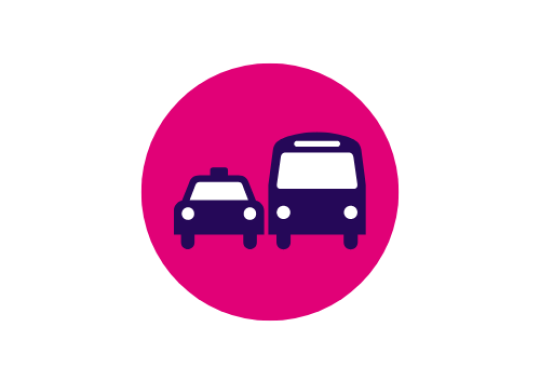Blue Badge Scheme
If you have problems with walking or other mobility problems you may be able to get a Blue Badge to enable you to park your car near shops and other places you wish to visit.
Contents
Automatic qualification for a blue badge
Special rules if you have a child under the age of three
Where does the Blue badge scheme operate?
Exemption from congestion charging in London
More help and information on the blue badge scheme

Want to donate?
These factsheets will always be free, so that everyone who needs them can access them, no matter what!
However, if you found them helpful and are able to, why not consider making a small suggested donation of £1 towards our work?
What are the rules?
You can get a blue badge by any of the following ways.
Automatic qualification for a blue badge
You qualify automatically for a Blue Badge if you are aged two or over and one of the following applies:
- You are registered blind or severely sight impaired or, in Scotland, are under 16 and have a letter confirming your eligibility from your visual impairment care team.
- You get the higher rate mobility component of disability living allowance (DLA) or child disability payment.
- You live in Scotland and previously got an indefinite or lifetime award of the higher rate mobility component of DLA, which has ended following a personal independence payment (PIP) re-assessment.
- You live in England or Northern Ireland and have been awarded 8 points or more in the ‘moving around’ activity of PIP, or 10 points in the 'planning and following journeys' activity on the grounds that you cannot undertake any journey because it would cause you overwhelming psychological distress.
- You live in Scotland or Wales and have been awarded 8 points or more in the ‘moving around’ activity or 12 points in the ‘planning and following journeys' activity of PIP or adult disability payment (ADP). In Scotland, this will continue to apply for ADP if you are not awarded the appropriate points at review and are paid short-term assistance while you are challenging the decision
- You live in Scotland and previously got a fixed-term award of the higher rate mobility component of DLA, have not been awarded the appropriate points at a PIP re-assessment (as in the above bullet) and have asked for a mandatory reconsideration of the decision in the last year.
- You live in Scotland and have been awarded the enhanced rate of the mobility component of ADP because you are terminally ill.
- You get war pensioners’ mobility supplement.
- You have received a lump sum payment from the Armed Forces Compensation scheme (within tariff levels 1-8) and have been certified as having a permanent and substantial disability that causes inability to walk or very considerable difficulty in walking.
- You live in Wales and have received a lump sum payment from the Armed Forces Compensation scheme due to a permanent mental disorder (tariff level 6).
Assessment for a blue badge
You may also qualify for a Blue Badge by being assessed by your local authority if you are aged two or over and one of the following applies:
- You live in England and one of the following applies:
- you cannot walk at all
- you cannot walk without help from someone else or using mobility aids
- you find walking very difficult due to pain, breathlessness or the time it takes
- walking is dangerous to your health and safety
- you have a life limiting illness, which means you cannot walk or find walking very difficult and have an SR1 form
- you are constantly a significant risk to yourself or others near vehicles, in traffic or car parks
- you struggle severely to plan or follow a journey
- you find it difficult or impossible to control your actions and lack awareness of the impact you could have on others
- you regularly have intense and overwhelming responses to situations causing temporary loss of behavioural control or
- you frequently become extremely anxious or fearful of public/open spaces.
- You live in Northern Ireland or Wales and have a ‘permanent and substantial disability which causes inability to walk or very considerable difficulty in walking’.
- You live in Scotland and are unable to walk or virtually unable to walk because of a substantial disability which is likely to last for at least 12 months.
- You drive regularly, have a severe disability in both arms and are unable to operate, or have considerable difficulty operating, all or some types of parking meter.
- You live in Scotland, have a mental condition and lack an awareness of the danger from traffic.
- You live in Wales and as a result of a severe cognitive impairment are unable to plan or follow any journey without someone’s help.
- You live in Wales and have a terminal illness that seriously limits your mobility.
- You live in Wales and are recovering from, or awaiting treatment for, a serious illness or injury which is likely to last for at least 12 months.
Special rules if you have a child under the age of three.
You can get a Blue Badge if your child has a specific medical condition that means they:
- must always be accompanied by bulky medical equipment that cannot be carried around with the child without great difficulty; and/or
- need to be kept near a vehicle at all times so that they can, if necessary, be treated in the vehicle or quickly driven to a place where they can be treated.
Bulky medical equipment can include ventilators, suction machines, feed pumps, parenteral equipment, syringe drivers, oxygen administration equipment, continual oxygen saturation monitoring equipment and casts and associated medical equipment for the correction of hip dysplasia.
Where does the Blue badge scheme operate?
The Blue Badge scheme operates all over the United Kingdom (UK) but there are local differences in the scheme’s operation in certain London boroughs and other large towns or cities in the UK. In Northern Ireland, the scheme applies to on-street parking but you can also get a ‘white badge’ to access pedestrian zones.
Applying for a blue badge
Applications are processed by local authorities, or the Blue Badge Unit in Northern Ireland (0300 200 7818).
In England, you may be charged a maximum fee of £10; in Scotland, up to £20; in Northern Ireland the fee is £10; in Wales it is free of charge. The badge lasts up to three years.
You can apply online at www.gov.uk/apply-blue-badge if you live in England, Scotland or Wales, or at www.nidirect.gov.uk/articles/apply-or-renew-blue-badge if you live in Northern Ireland.
Exemption from congestion charging in London
If you hold a valid Blue Badge, you can apply for exemption from the congestion charge in London by paying a £10 administration fee.
You can register up to two vehicles that you would normally use to travel within the charging zone. This could be your own vehicle, or one you travel in.
For more information call 0343 222 2222 or visit https://tfl.gov.uk/modes/driving/congestion-charge/discounts-and-exemptions
An Ultra Low Emission Zone (ULEZ) is in place in central London in the same area as the Congestion Charge and in the inner London area bounded by the North and South Circular roads.
Most vehicles, including cars and vans, must meet tighter exhaust emission standards (ULEZ standards) or be liable for a daily charge to drive within the ULEZ area. However, there are some exceptions for disabled people, including Blue Badge holders.
Blue badge appeals
If your local authority refuses to issue you with a Blue Badge, you have no formal right of appeal. As many authorities have internal procedures for dealing with reviews, it is worth writing to ask for a review.
In Scotland there is a formal review process. If a local authority decides that you do not qualify, you can ask for a review of the decision within 28 days of receiving it.
More help and information on the blue badge scheme
Advice
Use advicelocal to get advice in your area.
See also our Getting Advice guide
Find out more
There is information about the Blue Badge scheme at www.gov.uk/blue-badge-scheme-information-council.
The Department for Transport has produced The Blue Badge Scheme Local Authority Guidance (England).

